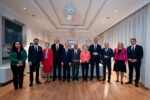The leader of Vetëvendosje, Albin Kurti, should seriously consider forming a coalition to establish the new government. This was stated by Riho Terras, the European Parliament’s rapporteur for Kosovo and an Estonian politician.
“I know it’s difficult, but we’ve seen in Germany that a grand coalition is possible. We’ve seen it in other countries as well, like Austria. So I believe that for the sake of progress, new elections are not the best way to solve the issue, because they likely won’t resolve anything,” said Terras.
He emphasized that negotiation and compromise are the foundation of democratic processes and said he prefers coalition-building over new elections.
When asked about Kurti’s insistence on Albulena Haxhiu’s candidacy despite repeatedly failing to secure votes across more than ten sessions, Terras replied that compromise is essential in politics—and anyone who cannot form a majority must be willing to back down from certain positions.
“I suggest compromise, though I don’t want to interfere directly in local politics,” Terras told Express.
Regarding the Kosovo-Serbia dialogue and collaboration with the new EU envoy, Peter Sørensen, Terras said he will meet him soon to discuss ideas on how to move forward.
“I’ll be meeting Ambassador Sørensen very soon to talk about possible paths to restart the dialogue. I have some ideas, but I need to coordinate them with the new envoy to ensure cohesion,” said Terras.
He noted that both the Kosovo and Serbian parliaments should be encouraged to engage in more cooperation and expressed hope that the new envoy would bring about needed changes.
“I never met Lajčák, so I don’t know what his approach was. I’m new to the process. But I’m sure that the new ‘sheriff in town’ will change some things. I really hope we can push the dialogue forward. Many things affect this process, but it’s always good to talk,” he added.
When asked if progress could be made without implementing agreements, particularly the Association of Serb-Majority Municipalities, Terras said that Serbia has also failed to implement several agreements and that “Kosovo cannot be the only one blamed.”
As for Kurti’s approach to the north of Kosovo, Terras said things could have been handled in a softer manner.
“Personally, I think there were too many heavily armed police on the streets—if you ask me,” said Terras, although he added that he understands Kurti’s reasoning.
“I understand why he’s pushing forward—you want to govern your own country and not have outsiders paying your doctors’ salaries. The Government of Kosovo must do more to help the north improve its living standards. That would solve the problem, but it’s not happening yet,” he stressed.
On the EU’s punitive measures against Kosovo, Terras called them unfair and unbalanced, saying they should be lifted as soon as possible.
However, he clarified that removing the sanctions requires a unanimous decision from the European Council, which he does not expect to happen any time soon.
“For the sanctions to be lifted, a unanimous Council decision is required—and I don’t see that happening right now. No good news,” he said.
Terras also said that the EU’s High Representative, Kaja Kallas, should take more initiative in lifting the sanctions, and that the European Commission should work harder on the issue of the five EU member states that still do not recognize Kosovo.
Speaking on Serbia’s political direction and the recent visit of President Aleksandar Vučić to Moscow to meet with Vladimir Putin, Terras stated that Vučić is showing he does not want to be part of Europe.
“Vučić is going to Russia for the May 9th parade. I don’t think Serbia deserves all the attention we’re giving it. I don’t believe Vučić wants to be part of the EU,” said Terras.
He criticized European Council President Antonio Costa’s visit to Vučić just two days after the Serbian president met with Putin—whom Terras described as “the biggest criminal in history.”
“At the very least, Costa shouldn’t have visited Vučić just two days after he met with the world’s worst criminal. Costa’s visit sends the message that the EU accepts Putin. It’s ridiculous. I think Serbia should face sanctions for that,” he declared.
On media freedom and Kosovo’s second consecutive drop in the Reporters Without Borders index, Terras said Kurti needs to better understand the importance of press freedom.
“My message is that media freedom is a prerequisite for a democratic government, the rule of law, and EU integration,” concluded Riho Terras, the European Parliament’s rapporteur for Kosovo.







